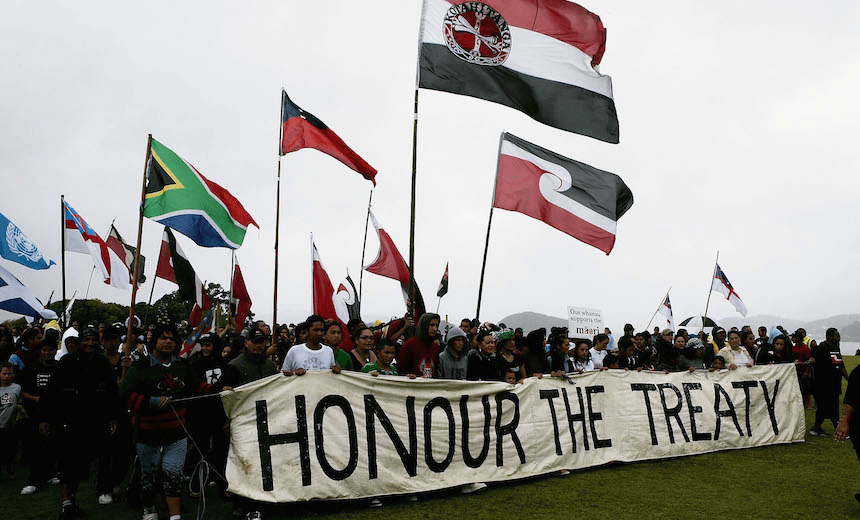It takes one generation to lose a language and three generations to restore it. Ahead of Te Wiki o Te Reo Māori, Rawinia Higgins, Māori Language Commissioner, writes about why the movement to recognise and restore te reo is as important as ever.
Right now New Zealanders are showing the rest of the world what kind of people we are.
He aha te mea nui o te ao? He tangata. He tangata. He tangata.
What is the most important thing in the world? It is people. It is people. It is people.
It isn’t easy living in lockdown, separated from the people and places who ground us and make us who we are. In our hardest times, New Zealanders turn to our first language for comfort and solidarity – for manaakitanga and kotahitanga. When our people were murdered in their place of worship on March 15, 2019, we sent aroha to their families. When our young soldiers were killed thousands of miles from home, we welcomed them home with an unforgettable haka. And right now when we see that flashing sign above a deserted motorway that says “kia kaha,” it’s telling us: Don’t give up.
The same applies to te reo Māori. Last year the Māori Language Commission held the Māori Language Moment to give people throughout Aotearoa a chance to stop and think about the value of te reo Māori to them, and to New Zealand. We did it because te reo is still endangered, it could still disappear if we don’t continue to fight for it.
Only a few generations have passed since our tīpuna were forbidden from speaking te reo Māori, stripped of the cultural anchor the language provides. In 1972 the Māori language petition was presented to parliament, asking for active recognition of te reo Māori. The Māori Language Moment is held on the anniversary of that day.
The petition was the catalyst for a wider awareness of the importance of te reo Māori – led by Māori who were primarily first or second generation non-language speakers. They were acutely aware of the impact of being stripped of their mother tongue.
With over 30,000 signatures, the petition was a significant starting point for the revitalisation of te reo Māori. Almost 50 years later, that revitalisation effort is ongoing. And it’s not just one for those who whakapapa Māori.
A study from early 2020 suggested that while there has been an uptick in casual speakers of the language – from 150,000 in 2013 to 185,000 in 2018 – there are significant factors that could see numbers of those fluent in te reo still decline. We know that eight in 10 New Zealanders see te reo Māori as part of our national identity, and our young people are leading the way in continuing the revitalisation and investment in the value of our nation’s first language. Last Māori Language Week more than one million of us stopped what we were doing and celebrated te reo together.
The national identity of Aotearoa has drawn so much from te ao Māori. Kupu like “whānau”, “aroha”, and “kia ora” have become unique parts of how we communicate in Aotearoa that capture concepts that define who we are. Appreciating and pronouncing te reo correctly can make a huge difference in how people perceive the value of the language.
In the chaos of the last 18 months, New Zealanders have shown their dedication to community and collective action. While there are currently restrictions on coming together in person, we want everyone to stand together to feel the wairua of te reo Māori. As Covid-19 lockdowns have become a new reality, we have designed a virtual Māori Language Moment, celebrating the strength of our language, and of our people, so we can come together while so many of us must still remain physically apart.
It is easy to assume that our language is in a healthy state with the level of interest, investment and opportunities to access te reo today. However, what is often misunderstood about language vitality is that a language is strong when there is intergenerational transmission. People often struggle to understand why we need to make investments in te reo because the outcomes are realised over such a long period of time.
My pākehā grandparents surely never imagined that they would have Māori grandchildren or great-grandchildren, but that became their reality. Supporting te reo is also about supporting the potential of your future whānau and valuing their heritage.
It takes one generation to lose a language and three generations to restore the language. For many whānau they may have only just created generation one, and that needs to be celebrated and acknowledged, as making that first step takes hard work. Language revitalisation is like a relay race where we carry the baton and hand it on to the next generation. In handing on the baton, we need to ensure that the same value and passion for the language is shared by the next generation in order to continue that relay far into the future.
Kia kaha te reo Māori. May our language be strong.
Kia kaha Aotearoa. May our country be strong.
Kia ora Aotearoa. May our people be well.
Join us in celebrating te reo Māori at 12pm on Tuesday 14 September. Sign yourself and your workplace, whānau and flatmates up to our Māori Language Moment.
This content was created in paid partnership with Te Taura Whiri i te Reo Māori. Learn more about our partnerships here.





